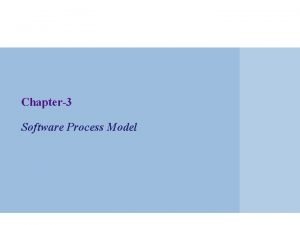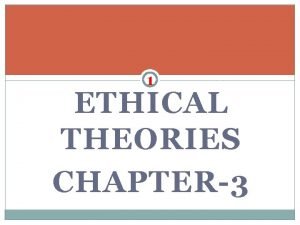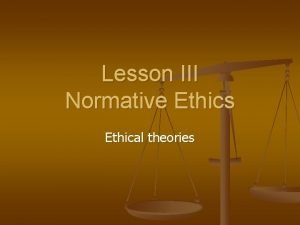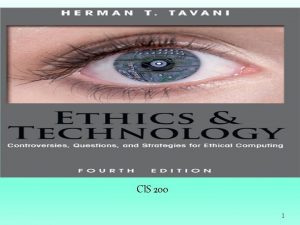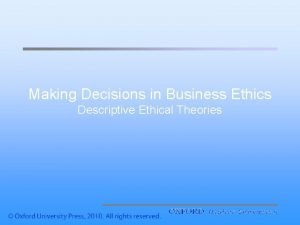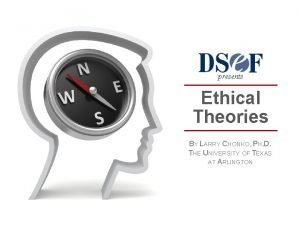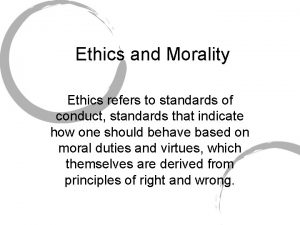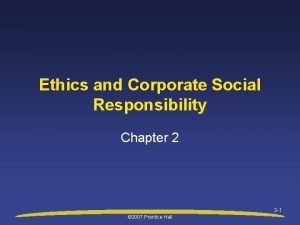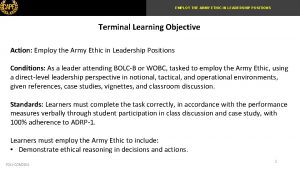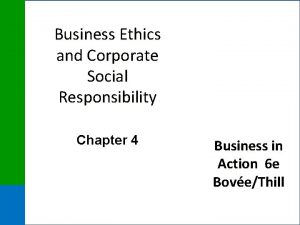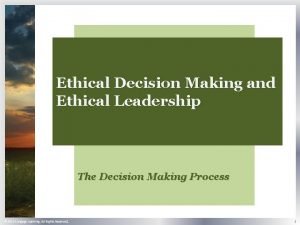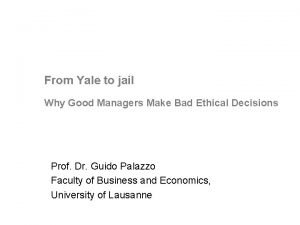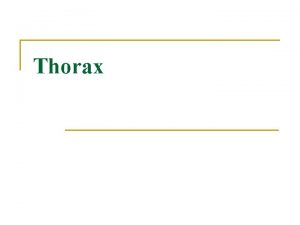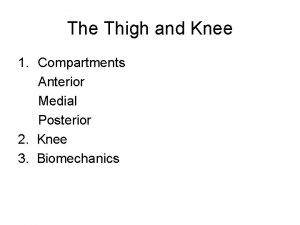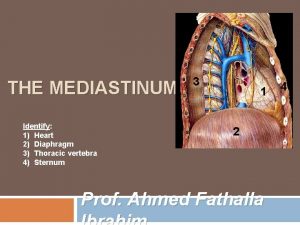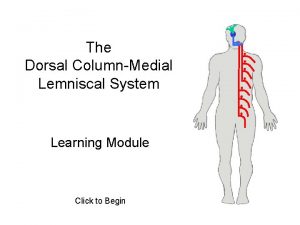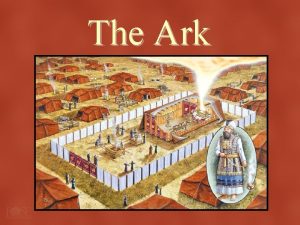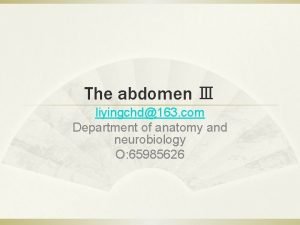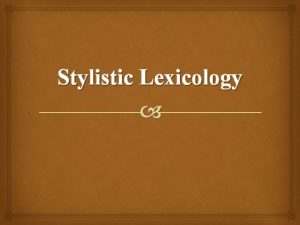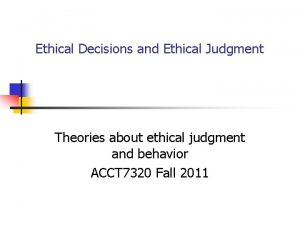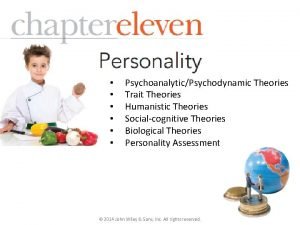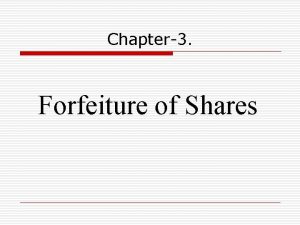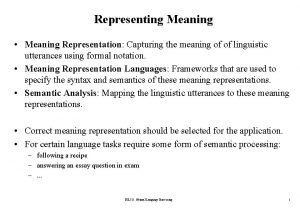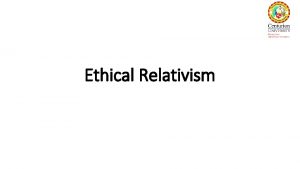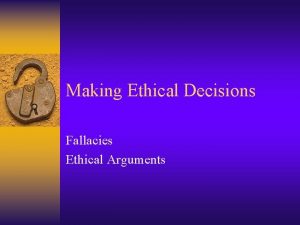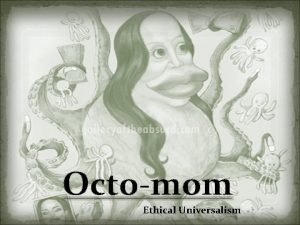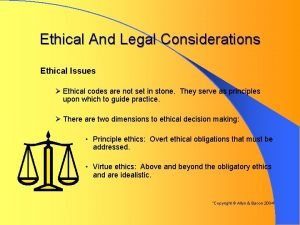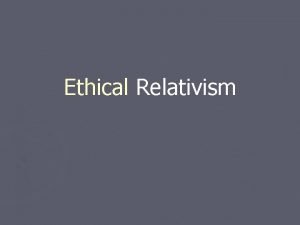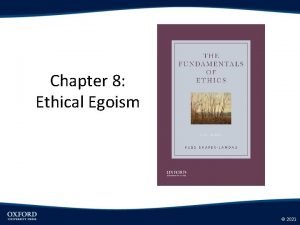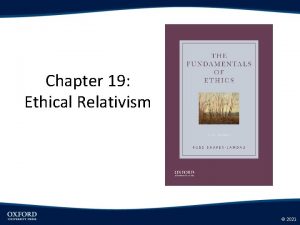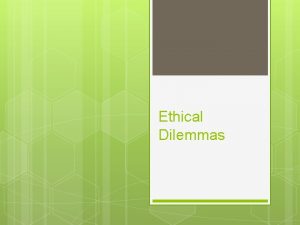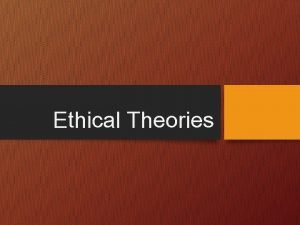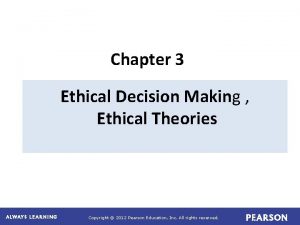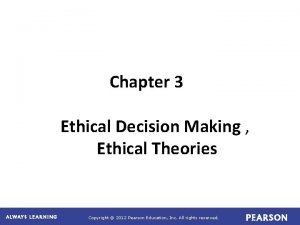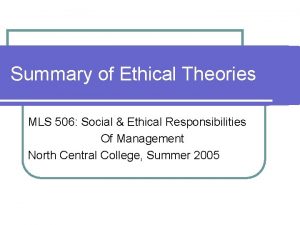1 ETHICAL THEORIES CHAPTER3 CONTENTS 2 MEANING WHY









































- Slides: 41

1 ETHICAL THEORIES CHAPTER-3

CONTENTS 2 �MEANING �WHY WE NEED ETHICAL THEORIES �MEANING OF MORAL REASONING �NORMATIVE THEORIES �TYPES �TEOLOGICAL THEORY AND TYPES �UTILITARIANISM �THEOIES OF UTILITARIANSIM �NON CONSEQUENTIAL THEORIES

MEANING OF ETHICAL THEORY 3 Ethical theory organizes moral judgements and provides moral principles. In order to determine whether a particular action, conduct, behavior or judgement is right or wrong, we need to test it on basis of some ethical principles. These principles are provided by ethical theories. Ethical theories are normative theories that upheld some rule or norm.

WHY WE NEED ETHICAL THEORIES? 4 �General rules do not prove to be sufficient to judge right or wrong in all situations. �People possess conflicting intuitions about general rules relating to morality �New situations and practices are not properly addressed by age old moral rules �Ethical theory provides logical answer as to why a particular action is right or wrong �Ethical theory provides justification and defends basic moral principle.

MEANING OF MORAL REASONING 5 Moral reasoning is the process of drawing out of the logical relation among the hierarchies of judgement so that the morality of judgement at a lower level is determined by seeing whether and how it is related to the judgements at the next higher level ESSENTIAL COMPONENTS: Understanding requirements of moral standards Evidence or information that a particular person, policy, institution, or behavior has the feature of moral standards

NORMATIVE THEORIES/ ETHICAL THEORIES TO MORAL REASONING 6 Ethics is a normative study, that is, an investigation that attempts to reach normative conclusions. It aims to arrive at conclusions about what things are good or bad, or what actions are right or wrong. A normative ethical system is an ordered set of moral standards and rules of conduct by reference to which, with the addition of factual knowledge, one can determine in any situation of choice what a person ought or ought not to do so.

TYPES 7 NORMATIVE THEORIES Consequentialist/ Teological theories Egoism Utillitarianis m Non-consequentialist/ Deotological Theories Kantian Theory Divine comman Theory Virtue Ethics Theory

TELEOLOGICAL THEORIES 8 It is also known as CONSEQUENTIALITY ethics. It starts with goals of an action. Teleologists assess an action by the extent to which it further these goals. Teleological ethics states that an action is right in so far as it has good consequences. Thus a right action is the one which has good consequences and a wrong action is the one which has bad consequences. Teleologists decide the rightness of an action solely by its results. According to William Shaw the Teleologists determine what is right by weighing the ratio of good to bad that an action is likely to produce.

Types Of Consequentialist Theories 9 EGOISM: It advocates individual self interest as its guiding principle. Its states that an action is good if it produces results to maximize a person’s self interest. It associates morality with self interest. According to William Shaw egoism contends that an act is morally right if and only if it is best promotes an agent’s long term interest.

CONTINUATION 1 0 PSYCHOLOGICAL EGOISM: Moral philosopher many times distinguishes ethical egoism from psychological egoism. Paul Taylor describes psychological egoism as a factual theory about human motivation and behavior, It says that everyone always and necessarily act selfishly. Every person acts so as to promote his own self interest. The sole end of every act is the agent’s own good.

CRITICISM ON EGOISM 11 Egoism supports selfishness that cannot be regarded as virtue in our life Psychological egoism states that everyone is motivated by self interest is not a sound theory Egoism is a ethical theory is not really a moral theory at all Ethical Egoism ignores blatant wrong doings

EXPALNATION OF CRTICISM 12 �Selfishness has always been regarded as a vice and an immoral conduct �We have found that many of our heroic acts are motivated by the concern and welfare of others, than by self interest. �If we accept egoism as a moral theory then we are misunderstanding the nature and point of morality �Egoism does not take a stand against outrageous acts life murder, theft and robbery, fraudulent practices, falsification etc.

UTILITARIANISM 13 Utilitarianism as an ethical system is propounded by Jereme Bentham and John Stuart Mill. It is based on concept of utility. ASSUMPTIONS: �Considers general welfare-universalistic approach: - Utilitarianism approach provides that while calculating the consequence of an action, one has to consider its overall impact on all people affected by such action. �Considers all equal and important: - It treats all person equal and each person good to be important. Therefore the moral calculation is made on an impersonal basis so that the morality applied yields same result whether the decision is made by one or another.

STEPS TO CALCULATE THE IMPACT OF AN ACTION 14 Consider the good/ bad produce by the action Consider the good and bad in relation to all the persons directly affected by the action Add both of the above Aggregate arrived in C gives the overall impact of an action

FORMS OF UTILITARIANISM 15 �Act-Utilitarian: It denotes that an action is justified if it provides the maximum benefits or conversely, the course of an action that does the least harm, to stakeholders. �Rule-Utilitarian: It denotes that an action is justified if it confirms to a set of rules the general acceptance of which would provide the maximum benefits, or conversely, the course of action that does the least harm, to stakeholders.

STRENGTHS 16 It is believed that actions are right if they are useful to majority of people The worth of each action is judged primarily on its own merits.

CRITICISM 17 The notion of utility is very VAGUE There are doubts regarding what is MAJORITY It is very difficult to forsee the consequences with accuracy Approach sometimes results in in unethical and immoral choices as it judges morality by resuls only and not by mean The ethical dilemma is to measure the benefits and harm that will be done to each stakeholder

TYPES OF UTILITARIAN THEORY 18 BENTHAM’S THEORY OF UTILITY MILL’S UTILITARIAN THEORY JELILINEK’S THEORY SIMMEL’S VALUE RELATIVISM THEORY OF PERFECTIONISM

BENTHAM’S THEORY OF UTILITY 19 � The core issue of their theory of ethics is utility. Concept of Utility: According to Bentham, principle of utility as explained in terms of ‘pleasure’ and ‘pain’ is the motivation behind every human action. According to him, ‘a thing is said to promote the interest, or to be for The interest of an individual, when it tends to aid to the sum total of his pleasures or what comes to the same thing, to diminish the sum total of his pains’. Thus utility means an action that produces greatest happiness to greatest number of people. The concept of utility is not static but relative and has to be applied in relation to the other course of action available to a person.

CONTRIBUTION OF BENTHAM’S UTILITY THEORY 20 �The source to identify functions of the state: - Bentham further related the notion of utility in relation to the state. According to him the justification for existence of a state is its social utility. �Means to legal and constitutional reforms: Bentham’s treats each one equal in the eyes of law. His views have been instrumental in incorporating legal equality in their constitutions by many countries.

CRITCISM OF BENTHAM’S UTILITY THEORY 21 The utility theory given by Bentham was criticized due to following reasons: = �Utility is a vague concept: - The concept of utility in terms pains and pleasures is described as vague. To treat that pleasure is always good and pain is always bad is said to be arbitrary. �Recognizes quantitative difference: - The theory only recognizes quantitative difference between pleasures. It ignores qualitative differences. �Felicific Calculus is absurd: -The felicific calculus given to measure relative value of intensity and duration is not logical.

MILL’S UTILITARIAN THEORY 22 �J. S. Mill was a disciple of Bentham and accepted his utilitarian theory. However he made certain modifications to suit it to the changing time. Mill made following modifications: Recognized only qualitative difference of pleasures Pleasures cannot be measured Principle of moral obligation Self- realization is final end of life Liberty is an end in itself Tradition and history are important

EXPLANATION 23 � RECOGNIZED ONLY QUALITATIVE DFIFFERENCE OF PLEASURES: - Mill accepted that apart from quantitative difference, pleasures also differ qualitatively. He agreed that some pleasures might be of higher quality than others. � PLEAURES CANNOT BE MEASURED: - Mill rejected the felicific calculus to measure the intensity and duration of pleasures. He accepted that pleasures cannot be measured objectively and do differ in quality. � PRINCIPLE OF MORAL OBLIGATION: - Bentham’s utility concept altogether ignores moral issues. But Mill recognized the principle of moral obligation. � SELF REALIZATION IS FINAL END OF LIFE: - Mill believed that the final end of life is not happiness but dignity. According to goodness cannot be measured by utility. � LIBERTY IS AN END INITSELF: - Mill considers utility to be subordinate to liberty. He treats liberty fundamental for mankind as an end above the principle of utility. � TRADITION AND HISTORY ARE IMPORTANT: - The utilitarian theory of Bentham disregards tradition and history. Mill however regarded both of them important

SIMMEL’S VALUE RELATIVNESS THEORY 24 The theory emphasizes that social sciences are normative and teleological. According to him it is not the individual who has to make judgement on rightness of an action. Only a moral authority can decide the rationality of ethical norms. He stresses that one should not be concerned with the apparent merits or demerits of an act himself but should leave it for the moral judges to decide

JELLINEK’S THEORY 25 The core of Jellinek ’s theory is that there is a distinction between theoretical political science and applied political science. As an applied science, political science aim at attaining certain social ends, The social ends involve value judgements for which no scientific evidence can be provided. Therefore, scientific method can be prescribed to ascertain rightness of an act

THEORY OF PERFECTIONISM 26 Theory of perfectionism is a combination of variety of ideas to constitute a novel school of thought about moral reasoning. This theory has its roots in Greek thinkers who termed it as EUDAIMONISM. This is synonym of virtue. Virtue symbolizes an act that gives a feeling of joy. Therefore, an act that gives joy was considered right.

NON-CONSEQUENTIALIST THEORIES/DEONTOLOGIST THEORIES 27 Traditional Judeo-Christian approach to morality is deontologist approach. This approach rejects the claim of those who follow Teleological theories. Deontologist theory evaluate ethical value of an act as per the decision process involved therein. These theories determine morality of a decision on basis of rules or principles applied in taking a decision. The result or outcome in this case is immaterial. According to Richard T. DE George, this approach states, ‘ duty is the basis of moral category, and that duty is independent of consequences. An action is said to be right if it has certain characteristics or is have a certain kind and wrong if it has other characteristics or is of another kind

IMPORTANT DEONTOLOGICAL MORAL REASONING THEORIES 28 1) KANT’S MORALITY THEORY: Morality theory of Kant treats that weather an act is right or wrong does not depend upon its consequences but is essentially a question of one’s moral duty. If a person does something as his moral duty. It is bound to bring happiness and pleasure. The theory is based according to Manuel G. Velasquez upon the assumption that “ everyone should be treated as free person equal to everyone else. Kant holds that a person renders his ethical decision on basis of what is right, regardless of consequences of decision

CONTINUATION 29 Some of the rights recognized by him are: 1)Freedom of speech 2)Freedom of consent 3)Right of privacy 4)Freedom of conscience CRTICISM: 1) All actions are not moral actions: Kant’s concept of the moral worth of an action is too severe. According to Kant an act is moral only when it is performed with a sense of duty.

30 �Kant’s categorical imperative is hardly correct to test of right : This is second important objection on Kantian approach. The categorical imperative talks about a universal command or rule which is to be followed without exception. �Kant’s ambiguous concept of treating People as means: Kant holds in his criticism on treating as means. Kant states that for a true moral conduct, people should always be thought of and treated as ends in themselves and not as means.

2) CONFUCIUS MODEL 31 Moral rule model of Confucius is as follows: �Do not do to others. Which you don’t wish to be done for you �Do not look for quick results. Nor look for small advantages �When you see someone of worth, think of how you may emulate �Wealth and rank desired by people be obtained in the right way �Feel kindly with everyone but intimate with virtues only

3) FIRST FORMULATION 32 According to Velasquez the first version of Kant’s is based upon following principle: “An action is morally right for a person in certain situation if, and only if, the person’s reason for carrying out the action is a reason that he or she would be willing to have every person act on, in any similar manner. The above principle is based on the golden rule, “do unto others as you would have them do unto you”

4) SECOND FORMULATION 33 The second formulation according to Velasquez is reproduced as follows: An action is morally right for a person, if and only if, in performing the action, the person does not use others merely as a means for advancing his or her interest , but also both respect and develop their capacity to choose freely for themselves. FEATURES: �Not to use others as a means to advance own interest �People have liberty and have freedom to choose

VESIONS OF DEONTOLOGICAL THEORIES 34 �Act Deontological Theories This is an extreme reaction to traditional rules. This theory does not consider any pre set rules or standards to determine what is right or what is wrong. �Rule Deontological Theories: This theory is based upon the fact that there are no specific rules that can be followed in all situations. Therefore one has to act in a specific way under a specific situation. According to W. D. ROSE, “one can formulate numbers of moral rules that hold without expectation”

36 THE DIVINE COMMAND THEORY: An important rule comprised in deontologist theories is the divine command theory. This theory views that universal principles of morality emerge from religion only. According to this theory the basis of right and wrong is the will of god. VIRTUE ETHICS THEORY: It is a deontological theory that claims that key to good ethics lies not in rules, rights and responsibilities, but in the classic notion of character.

CASE STUDY 36 Abstract Case description Nurses face more and more ethical dilemmas during their practice nowadays, especially when they are taking care of the patient at end of life stage. The case study demonstrates an ethical dilemma when nursing staff are taking care of an end stage aggressive prostate cancer patient Mr Green who expressed the suicide thoughts to one of the nurses and ask that nurse keep secret for him in Brisbane, QLD, Australia

37 Ethical dilemma identification The ethical dilemma is identified as “if the nursing staff should tell other health care team members about patient's suicide attempt without patient's consent”. Analysis To better solving this case and making the best moral decision, the ethical theory, the ethical principles and the Australian nurses' code of ethics values statement, the associated literature relative with this case are analyzed before the decision making.

38 Ethical decision making After consider all of the above factors, in this case, the best ethical decision for the patient is that the nurse share the information of Mr Green's suicide attempt with other health care professionals.

39 �Results �In Mr Green's case, the nurse chose to share the information of Mr Green's suicide attempt with other health care professionals. The nursing team followed the self-harm and suicide protocol of the hospital strictly, they maintained the effective communication with Mr Green, identified the factors which cause patient's suicide attempt, provided the appropriate nursing intervention to deal will these risk factors and collaborated with other health care professionals to prefect the further care. The patient transferred to a palliative care service with no sign of suicide attempt and other self-harm behaviors and passed away peacefully 76 days after discharged with his relatives and pastors accompany.

MY TAKE 40 According to me nurses did took the right step and here I can see the application of Mill’s Utilitarian Theory

RECORDING BY NORMAN E. BOWIE 41
 Software requirement and design
Software requirement and design Chapter3
Chapter3 Ethical theories utilitarianism
Ethical theories utilitarianism Pictures
Pictures Ethics in healthcare definition
Ethics in healthcare definition What is consequentialism
What is consequentialism What is virtue ethics
What is virtue ethics What are the 4 ethical theories
What are the 4 ethical theories Utilitarian theory of rights
Utilitarian theory of rights Theories of business ethics
Theories of business ethics Workable ethical theories
Workable ethical theories Larry chonko
Larry chonko Ethics refers to:
Ethics refers to: Perbedaan ethical dilemma dan ethical lapse
Perbedaan ethical dilemma dan ethical lapse Army ethical lenses
Army ethical lenses Perspectives of csr
Perspectives of csr Ethical habits
Ethical habits Don't ask why why why
Don't ask why why why Importance of theory
Importance of theory From yale to jail
From yale to jail What is fair trade coffee why is it an ethical issue
What is fair trade coffee why is it an ethical issue Componential theory of meaning
Componential theory of meaning Disadvantages of componential analysis
Disadvantages of componential analysis Language
Language Reference as a theory of meaning
Reference as a theory of meaning Victorian curriculum ethical capabilities
Victorian curriculum ethical capabilities Konsep esensial dasar-dasar desain grafis
Konsep esensial dasar-dasar desain grafis When organizing your career portfolio you should
When organizing your career portfolio you should Deep perineal pouch contents
Deep perineal pouch contents Fresh frozen plasma contents
Fresh frozen plasma contents Ffp clotting factors
Ffp clotting factors Posterior mediastinum
Posterior mediastinum Ligamentum patellae
Ligamentum patellae Level of the sternal angle
Level of the sternal angle The immortal life of henrietta lacks table of contents
The immortal life of henrietta lacks table of contents Contents of internal capsule
Contents of internal capsule Triangular space contents
Triangular space contents Golden lampstand tabernacle
Golden lampstand tabernacle Comic book table
Comic book table Ligament of treitz location
Ligament of treitz location Mla table of contents
Mla table of contents Contents of stylistic lexis
Contents of stylistic lexis
